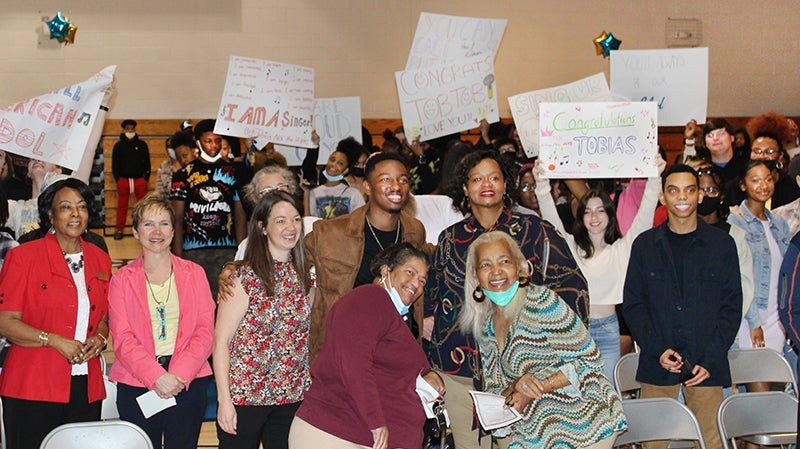Vidant RCH welcomes ‘CHIP’
Published 10:20 am Monday, May 9, 2016
AHOSKIE – Formally his name is Cerebrovascular Hemorrhagic Ischemic Pal.
However, to avoid repeating that tongue twister, you can just call him CHIP.
On Tuesday morning, Vidant Roanoke-Chowan Hospital unveiled a new program that uses the latest in technology to provide quicker round-the-clock evaluation and treatment of stroke symptoms.
The star member of that new program is CHIP, a robot given his name during a contest conducted among Vidant RCH staff. CHIP is a highly specialized telemedicine robot that allows a stroke expert located at Wake Forest Baptist Hospital in Winston-Salem to evaluate patients in Ahoskie and consult with local emergency doctors in real time through the internet. Treatment can begin immediately.

Vidant RCH emergency department nurse manager Dee Dee Morris (left) and Valorie Cooke, Clinical Education Director at the hospital, pose with CHIP – the latest technology in use at the Ahoskie-based hospital that specializes in the treatment of patients suffering from a stroke. | Staff Photo by Cal Bryant
“Our goal is to reduce death and disability caused by strokes,” states Dee Dee Morris, nurse manager of the Vidant RCH emergency department and the telestroke program coordinator. “Vidant Health is partnering with the Wake Forest Baptist Telestroke Network to give patients immediate access to Wake Forest Baptist’s stroke experts 24/7 via technology that provides two-way video, audio consultation and image sharing.”
As it is with any serious, life-threatening medical condition, time is precious.
“Or as we like to say when a person suffers a stroke, time is brain, as in treating this patient immediately in order to quickly dissolve a blood clot which gives a stroke victim a better chance at survival and hopefully returning to a normal life following rehabilitation,” said Valorie Cooke, Clinical Education Director at Vidant RCH.
Upon the arrival of a stroke patient at the RCH emergency department, Morris said that person is quickly assessed for the main symptoms of the problem – slurred speech, one-sided weakness, headaches, etc.
“If those symptoms have occurred within the last six hours, we activate CHIP,” she said.
That activation first involves the patient having a CT scan. While the results are pending from that scan, personnel in the emergency department will contact Wake Forest Baptist Hospital to put them on standby for CHIP.
“They (a doctor in Winston-Salem) will be able to go into our system and see the images of the CT scan,” Morris explained. “They will then talk with our doctor here and make a recommendation for treatment.”
A camera lens on CHIP also allows the doctor in Winston-Salem to have a live look at the patient in the Vidant RCH emergency department.
“That allows the doctor there to make a further assessment on what he or she is actually seeing with the patient’s condition, and that’s all in real time,” Morris noted. “The doctor there can ask questions and instruct a nurse here to perform certain physical tasks that will aid in the patient’s overall medical assessment. The doctor there also has access to all the vital signs of the patient – blood pressure, heart rhythm, pulse, etc.”
The treatment can involve prescribing a certain type of medication to dissolve the blood clot on the patient’s brain, or advising Vidant RCH staff to transfer the patient to another medical facility for advanced care.
“Having immediate access to a neurologist is a great resource for us,” Morris stressed.
“This is the wave of the future,” stated Cooke. “When you’re out at rural hospitals like we are and there are not specialized doctors, such as neurologists, at hand, this gives us immediate access to an advanced level of care.”
Morris said the association with Wake Forest Baptist Hospital was forged due to that Winston-Salem facility being a regional leader in neurological medicine, surgery and treatment.
“Vidant is working to develop a strong neurological program and our association with Wake Forest Baptist Hospital serves as a bridge until that time,” she said.
A trio of Vidant hospitals in rural areas – Duplin, Beaufort, and Edgecombe – just recently went live with their telestroke programs. RCH joined Vidant Bertie Hospital in Windsor and Vidant Chowan Hospital in Edenton by unveiling their respective telestroke programs on May 3.
Cooke reminded the public of the best and easiest means to identity the symptoms of a stroke by using the acronym FAST. That stands for facial drooping, arm weakness, speech difficulty, and time to call 9-1-1.
“Time is critical; as soon as any of the signs and symptoms are identified, you should call 911,” Cooke said. “The quicker a stroke victim is treated, the chances for survival skyrocket.”
With May being Stroke Awareness Month, statistics show that every 40 seconds someone has a stroke. However, 80 percent of strokes are considered preventable.
High blood pressure is the number one cause of stroke, along with smoking. Doctors say reducing salt intake, exercising, keeping a healthy weight, avoiding tobacco and managing stress can help reduce stroke risk.
To learn more about stroke and stroke care, visit VidantHealth.com/Stroke.



